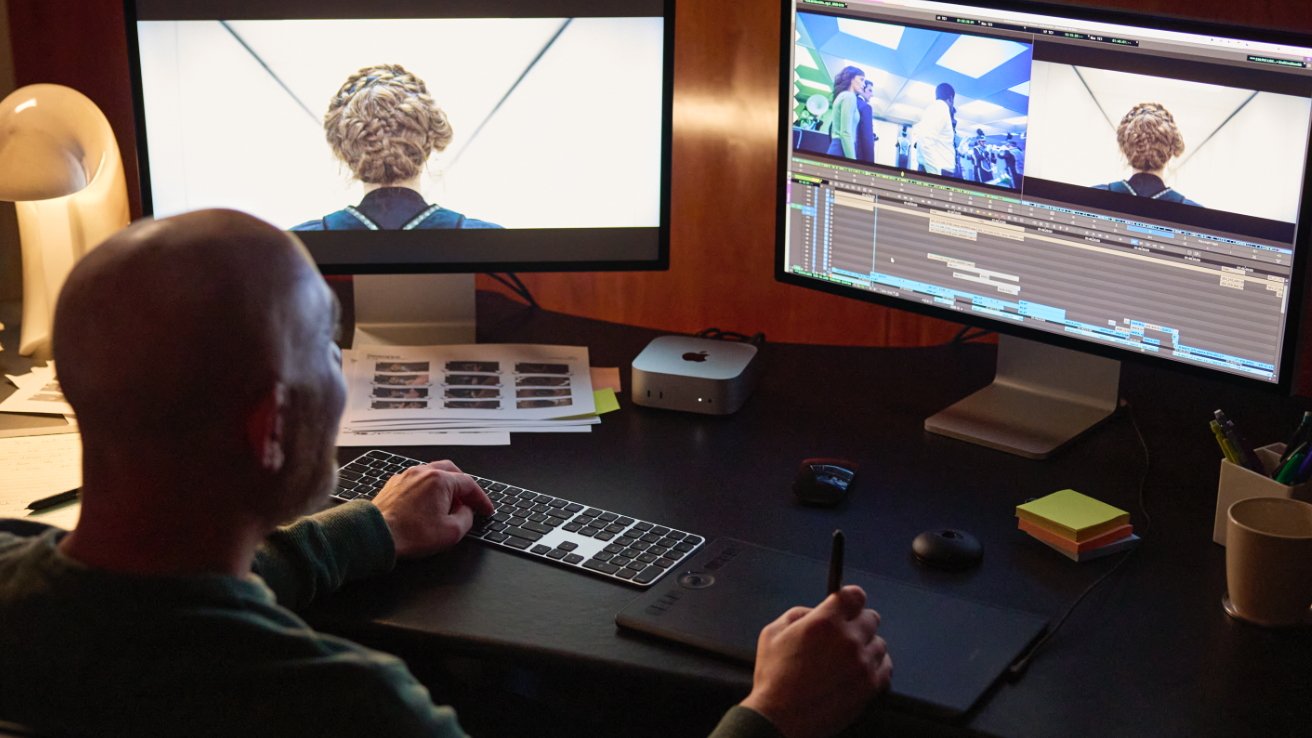'Severance' editor was all-in on Apple hardware, but not Final Cut Pro
Apple has focused the spotlight on how a "Severance" film editor primarily uses an iMac in conjunction with just about every shipping Mac there is to get his work done -- but chooses not to dwell on his choice of video editing software.

Geoffrey Richman editing "Severance" -- image credit: Apple
Apple has shown before just how much work went into editing solely the title sequence for season two of "Severance." Now it's detailed the work of editing the episodes themselves, with an in-depth look at exactly how one of the show's three editors work.
"For the finale, there was a lot of experimenting with structure and testing out different ideas about how to play out different scenes," said supervising editor Geoffrey Richman in a statement. "It was a constant flow of ideas and my Mac setup allowed for such a smooth experience."
It is a setup to drool over. Back in the day, if you wanted a complete one-stop TV drama editing solution, you made your show at BBC Television Center in London. Now you can go anywhere.
Richman works on his an iMac, but uses it to remotely connect into a Mac mini. Or he does when he's not using his iPhone, or taking his MacBook Pro to hotels to work with executive producer Ben Stiller
"I can work on my laptop and I can work on my iMac, and I can work at the post facility or I can work at Ben's office, and as long as I'm logged into my account, everything I do shows up everywhere," he says. "I could be lying in bed and I have a thought, and I'll type it into my iPhone, and then the next day, it just shows up in the Notes app on my desktop."
Richman talks a lot about this seamless workflow and how much he prefers the Mac to PCs. He talks a little about how much he enjoys having multiple apps open at once to get his work done.
But then in the detail of how he edits "Severance," Apple lets him get into the weeds about precisely how he performs shot selection, precisely how he matches video frames to audio music tracks. But then Apple does a cough coverup as it admits he uses Avid instead of Final Cut Pro.
"In cutting the marching band, there were about 70 angles and takes to choose from, so we synced them all up in one multicam clip with banks of nine [3x3 arrays]," continues Richman. "Being able to play nine angles simultaneously in real time -- and switch quickly between all the different options -- made it a whole lot easier to find what we wanted at any given moment."
Apple's spotlight on editing "Severance" does admit that Avid is "the industry-standard video editing software." But it's almost as if it's an excuse, as if Apple is saying Richman only uses it because that's what the industry requires.
It is what the industry requires. Yet here's a video editor working on an Apple TV+ drama, doing so using three Macs and an iPhone, and saying these are the best tools he's ever had.
There's also Apple's own Final Cut Pro video editing software which was a key player in bringing NLE (non-linear editing) to television and film production. Richman doesn't use it.

Geoffrey Richman and Ben Stiller (far right) reviewing an edit of "Severance" -- image credit: Apple
The saddest part is not that Final Cut Pro could do everything Richman describes, but that it might well have become the industry standard if Apple hadn't launched it the way it did. The original Final Cut Pro was a staple in Hollywood until 2011, when it was abruptly replaced by the entirely different Final Cut Pro X.
It would ultimately make Final Cut Pro a better app, but at the time it was such a huge change -- and there were initially so many missing features -- that video editors switched to Avid and Adobe's Premiere Pro.
Today there are production houses that solely use Final Cut Pro, and there are increasing numbers of television dramas that use it. But for all that Apple can rightfully boast about how its hardware is what the editor of "Severance" needs, it's a shame the software isn't there too.
AppleInsider has been told before by producers that Apple TV+ is very hands-off when a show is working -- and very hands-on with it isn't. Most recently, Ben Stiller revealed that Apple had never given the "Severance" team any notes at all.
That is remarkable compared to the rest of the television industry, and it is this kind of working relationship that will keep drawing talent to Apple.
Just, perhaps nobody would've objected too much if Apple had given them a note suggesting they use Final Cut Pro.
Read on AppleInsider

Comments
I mean, sure make the best software you can, but if some people choose to use an alternative--even working on an Apple-funded project--it's not a big deal. Now if they were using Windows PCs and Android phones...
14 years on and we're still revisiting this.
Apple's relaunch of Final Cut Pro was amazing. It what necessary. To move forward.
Then Apple seemed to stop innovating with it and it became an outdated piece of software. I transitioned to Davinci Resolve and haven't looked back. It's a shame that they pretty much abandoned it to focus on YouTubers and weekend filmmakers of skateboarding clips. It could have been the standard for video production, paired beautifully with the Mac Studio hardware and high-end monitors. Frustrating.
I'd be more worried about Resolve.
Final Cut Pro is not professional software. It is not fit for this purpose. The editor needs to use Avid for multi-camera bank and timecode sync support (he may or may not be able to use Adobe Premiere, but Avid shines in multicam workflow so it's hands-down the best tool for the job he described).
Final Cut Pro is not capable of doing what Avid is in this case and using Avid is the right choice for the show. FCP 7.x was somewhat competitive with Avid for TV and film production in the distant past, but Apple abandoned the pro market with FCP X when it completely rewrote the software and threw out all the professional features, forced the trashcan mac on everyone, and made many other questionable decisions that abandoned the pro market in the 2010-2020 era. Apple has not been a serious competitor in the NLE software space since. FCP is a fancy version of imovie at this point. It's not a good fit for actual professional working on large projects. For small stuff, it's perfectly fine. The audience is now youtube editors and one-man-band productions, not professional TV/Film productions.